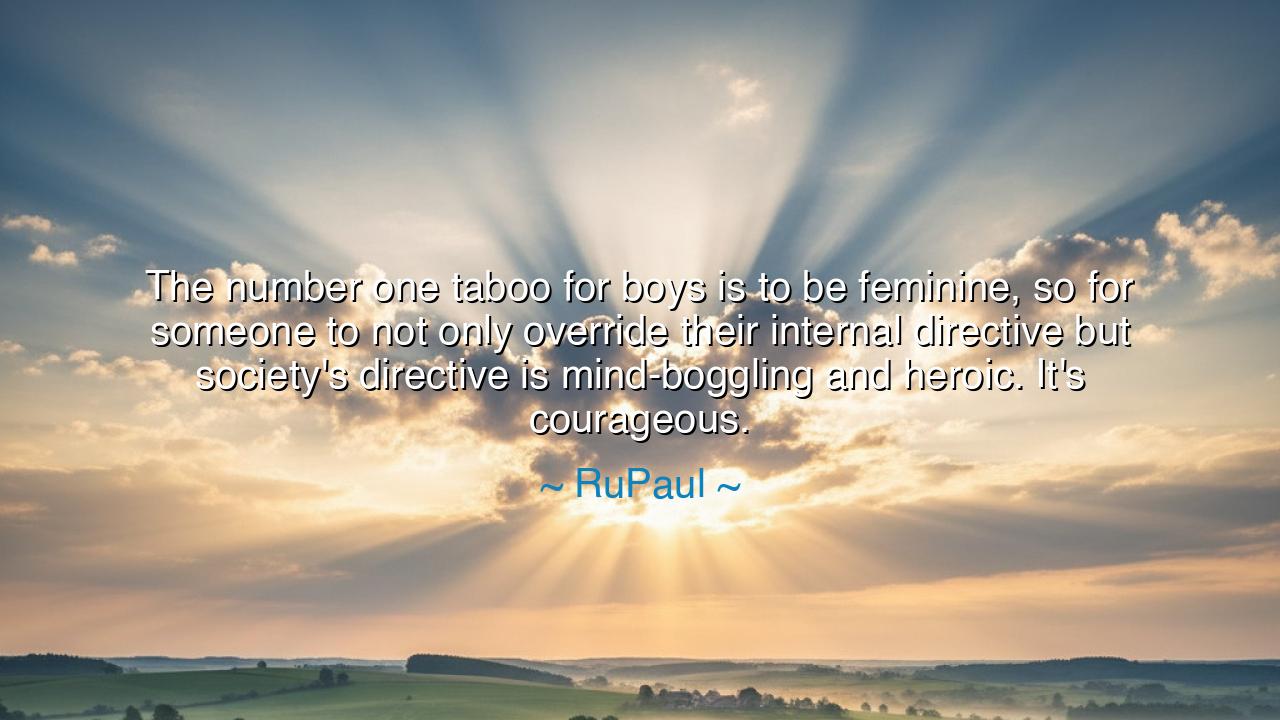
The number one taboo for boys is to be feminine, so for someone
The number one taboo for boys is to be feminine, so for someone to not only override their internal directive but society's directive is mind-boggling and heroic. It's courageous.






RuPaul, the master of transformation and the prophet of self-expression, once proclaimed: “The number one taboo for boys is to be feminine, so for someone to not only override their internal directive but society’s directive is mind-boggling and heroic. It’s courageous.” These words do not speak only to the world of performance or fashion, but to the very soul of identity, where fear, shame, and expectation battle against the flame of authenticity. RuPaul names the unspoken chains of culture: that from childhood, boys are told to run from softness, to silence their tenderness, to armor themselves against all that is called feminine.
The meaning of this statement is piercing. In many cultures, femininity is not seen as equal strength but as weakness, as something lesser. Boys are taught that to embrace gentleness, vulnerability, or beauty is to risk ridicule, exclusion, even violence. Thus the greatest taboo is not theft, nor dishonor, but to cross the boundary of gender expectation. To defy that directive—both the one hammered into the self and the one imposed by society—requires immense force of spirit. It is not mere rebellion, but a confrontation with the deepest fears of culture itself.
History gives us vivid proof of such defiance. Consider the sacred two-spirit people of many Native American tribes, who carried both masculine and feminine spirits within them. Though honored in their own traditions, they were later persecuted under colonial rule, mocked and erased by a society that could not tolerate difference. Yet their existence, their refusal to abandon their identity, was both heroic and courageous, a living testimony to RuPaul’s truth: to embody the forbidden is to walk a path of fire, and yet to shine as a beacon for others.
We might also recall the life of Oscar Wilde, the poet who dared to embrace beauty, flamboyance, and wit in an age when strict masculinity was demanded of men. He lived with brilliance, but also paid the price of prison and public scorn. Though crushed by the weight of Victorian morality, his legacy endured as a triumph of individuality over conformity. Wilde, like the unnamed boys RuPaul honors, showed that to embrace the feminine as a man is not weakness but a form of courage that future generations would celebrate.
RuPaul’s words also speak to the modern struggles of LGBTQ+ youth. A boy who paints his nails, who wears a dress, who walks with grace rather than swagger, is still too often a target of scorn and violence. Yet when he refuses to bow, when he insists upon his right to exist as he is, he embodies the very definition of heroism. His act is not small; it is a strike against centuries of rigid codes, a challenge to a world that would erase him. Each such act of courage expands the boundaries of freedom for all.
The lesson is timeless: true courage is not found only on battlefields, but in the quiet defiance of living one’s truth against overwhelming pressure. To break the greatest taboo is to open doors for others, to show them that the forbidden path is not death but life. Those who embrace what society despises—whether femininity in men, vulnerability in women, or difference in any form—are the ones who drag the world forward into greater humanity.
Practical action flows from this teaching. Do not punish softness in boys or silence tenderness in men. Celebrate those who dare to blur the boundaries of gender expectation. Teach children that feminine and masculine are not prisons but colors in the spectrum of human experience. And above all, honor those whose courage defies the deepest fears of culture, for they are the heroes who enlarge the space of freedom for us all.
Thus let RuPaul’s words be remembered: “To override both the inner and outer directive against being feminine is heroic and courageous.” Carry them as a torch, for they remind us that the noblest battles are fought not always with swords, but with authenticity. And when a boy dares to embrace what the world forbids, he is not weak—he is a warrior, a prophet, and a guide for a freer society yet to come.






AAdministratorAdministrator
Welcome, honored guests. Please leave a comment, we will respond soon